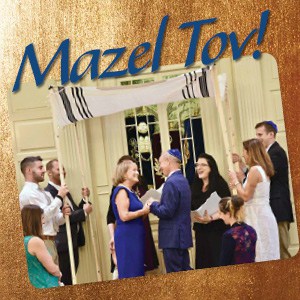Priceless work
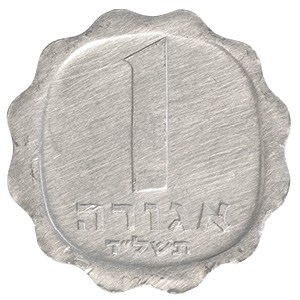 Stacy Apelt, jeweler at Either Ore Jewelers at Strawbridge—is well known to many of the local Jewish community.
Stacy Apelt, jeweler at Either Ore Jewelers at Strawbridge—is well known to many of the local Jewish community.
Many years ago, Apelt took over Sydney Ash’s business in the old Golden Triangle Hotel. Apelt has done repair work for other jewelry businesses on tasks their jewelers couldn’t do. He has worked for ambassadors, Super Bowl winners, John Denver, The Harlem Globetrotters, and made the gift for Queen Elizabeth II on her visit to Jamestown on its 400 anniversaries on 2007.
He is often asked to do complicated tasks repairing antiques made in the ways of days past and by the type of craftsmen that don’t exist today. In 2013, he was asked to restore all of the alter pieces for Temple Israel. Some of these silver pieces were 100 years old. They were almost all handmade by old school silversmiths. There were breastplates, torah crowns, rimonim, yads, and menorot. These exquisite pieces were far above the class of most modern Judaica.
The Torah Crowns and Rimonim were the most complex repairs. Made with hundreds of pieces, many of which were missing, they were assembled with handmade nuts and bolts. It’s not possible to go to ‘Rimonims-R-Us’ and get spare parts for these items. Besides re-creating these missing pieces, the work had to be done with kosher supplies—yes, there is such a thing as kosher metal polish and other polishing and cleaning supplies! Kosher baking soda, kosher rouge, and lots of kosher elbow grease (supplied by kosher elbows) are required. All work started with a prayer of “b’ezrat Hashem.”
To begin the project, dozens of close up photos were taken so re-assembly could be done correctly. Then, the task of disassembling the rimonim one piece at a time began, laying them out in a circle on the living room carpet. The largest torah case crown had 170 pieces. Everything was photographed again for positioning, the broken parts were repaired, new parts made to match, replacement bells ordered and created, and many missing sterling silver nuts and bolts made one at a time. The creatures that surround the crown look like dragons, but are actually called fantastic beats, or fantastic creatures. You might consider them to be the guard dogs for the seraphim.
The breastplates were severely dented, missing parts, and very tarnished and dirty. These were taken apart and new doors made for the mezuzah on the breastplates. The new doors were hand engraved with the proper characters and artwork. The dent repair work was done with hammers of varying hardness, ending with a felt hammer for the final smoothing blows. In reassembly, the photos were very important.
All this work was done on a time schedule to have everything finished in time for Rosh Hashanah. The pieces were rededicated for the congregation to start the new year.
Cost was never discussed, and when asked what the bill was, Apelt said, “It was a lot of work, I have to charge you a whole shekel.” One of the congregation leaders laughed, and said, “OK, now, let’s be serious.” Apelt replied, “I am always serious when it comes to money.” The rabbi later paid Apelt with one very old silver shekel.
Why do all this work for a shekel…because it is a mitzvah, and performing a mitzvah is its own reward.
Apelt can be found behind his workbench in Either Ore Jewelwrs at Strawbridge Marketplace, still doing repairs on family heirlooms, making new jewelry, and occasionally repairing really unusual pieces.
Love, uninterrupted: Carol Roth and Allan Brum
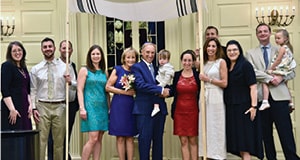
Carol Roth and Allan Brum at the renewal of their wedding vows.
As high school students in the late 60s, Carol Roth and Allan Brum went from good friends to dating. Things really heated up in college and Carol was sure that Allan was ‘the one.’ Unfortunately, Carol’s parents weren’t feeling it, and their unease with the relationship led to an almost-forever split.
“They made it very difficult for us to see each other,” says Allan. “The family issues just wore us down and we broke up.”
“We both married other people and had families,” says Carol, “But, I never stopped thinking about him.”
The internet intervened 27 years later, in 2002, when Carol received an e-mail from Classmates.com: ‘Hey Carol, have you reached out to any of your friends from Oceanside?’ “I looked for Allan’s name,” says Carol. “Lo and behold, there it was.”
Prior to filling out the contact form, Carol had already planned to separate from her husband with whom she had one daughter, Jessica. Carol was also a loving stepmother to Melissa, her husband’s daughter from a previous marriage. “Despite these powerful connections,” says Carol, “I knew something had to change.”
Allan immediately responded to the email with a request for her number and called three days later. During that call Carol broke down and shared what was in her heart. When she finally got around to asking about him, she learned that he had recently separated from his wife. Calling from a hotel where he was working as a television sports producer, he told her he had just left an apartment ‘full of boxes’ in Los Angeles.
“I was the love of his life, as he was mine,” says Carol. But concerns about how their respective daughters would handle things was one reason they both moved cautiously.
They started with a long-distance phone relationship.
“He was finishing my sentences by the third conversation. After all that time, he was able to jump into my brain and surprise me with how quickly he knew what I was thinking.” When the time came to take the leap, and see each other in person, the spark was immediate. “We felt the connection right away,” Carol says.
When Carol was recovering from surgery in the summer of ‘02, Allan flew to New Jersey to visit. He saw her 10-year-old gold Acura Legend in the driveway and told her, “I just left the same exact car in Los Angeles.” Of the many new discoveries made, driving the same Acura Legend was the least expected.
Carol and Allan celebrated 10 years of marriage on September 10, 2019 and renewed their vows surrounded by family and friends, standing under the chuppah at Ohef Sholom Temple. The wedding ceremony began with Cantor Jen Reuben singing, Etta James’ At Last.
Today, the couple does everything together—cook, walk the dog, and travel. They had their first fight on a flight coming home from Athens in 2004. “I was absolutely devastated. I just looked at him, crying, and said, ‘You’re the love of my life, I don’t want to fight with you.’
Allan laughed. His response was, “did you think we were never going to have a fight?”
“We may argue, but after so many years without contact, we don’t want to spend time being angry, so we make up easily. When I lament over the time we spent apart, Allan comforts me with his perspective on the matter,” says Carol.
‘G-d and fate intervened with those plans. Now is the time we’re meant to spend together.’”
Carol’s daughter Jessica moved to Virginia Beach with her husband Matt, one reason why Carol and Alan decided to make Virginia their new home.
Carol and Allan don’t have children together, but they do share a family and a home, which they recently built in Norfolk’s East Beach section. Jessica calls Allan her ‘bonus’ dad. Her children and her friends’ kids cherish their time with him. Carol grew close to Allan’s daughter Jenny when she moved to Los Angeles in 2006.
Allan has relatives in France who escaped Poland and survived the Holocaust. The “second chancers” as they call themselves, enjoy traveling; their favorite destinations so far include Australia, Hawaii, Venice, Paris, and Aixen Provence, France. France has a special place in their hearts, which is why they chose to celebrate Jenny’s 16th birthday with family and friends in Paris.
A parental blessing of their relationship may have been an issue in 1972, but it’s not one now. “I gave birth to one child, but have three daughters,” says Carol referring to her deep bonds with Jenny, Melissa, and Jessica.
“Jenny talks to Carol about things she’s not as comfortable telling her father,” says Allan. “If I’m not privy to something, I ask Carol. Carol is by far the person with the biggest heart of anyone I’ve met. She’s also the most honest.”
“Even at 50, I wanted my mother’s approval,” says Carol. “When my sister told our mother that Allan and I were back together she cried and said ‘we thought we were doing the right thing.’ Before my father died from complications from Parkinson’s in 2004, the four of us had dinner together in Florida. We could both tell how pleased they were about our reunion, and that I was happy.”
Allan says, “we finally had a chance to make up.”
Carol adds, “We both now take comfort that all four parents are watching, with approval, from above.”
Lisa Richmon
The other patient, birthday twins and Double Chai
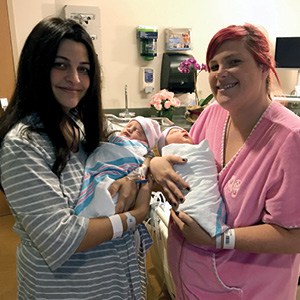
Carly Glikman and Allena Anglen with their newborns.
On June 25, Carly Glikman went to Sentara Leigh Hospital for a scheduled C-Section to deliver her second child. Glikman is United Jewish Federation of Tidewater’s outreach manager.
When the nurse started to prep Glikman for the procedure, she was told to stop and was pulled away. “I was told, ‘another patient is progressing quicker than we expected. We will have to deliver her son first and you’ll have to wait,’” says Glikman.
Due to the ‘other patient’s quick delivery, Glikman’s daughter was delivered about an hour later.
That night, Glikman saw a friend’s new baby post on Facebook.
“I saw that Allena had her son 36 minutes before me,” says Glikman.
Glikman and Allena Anglen became friends after meeting at a Young Adult Division Happy Hour. Anglen teaches elementary school students at Norfolk Public Schools. She created the Toddlin’ Around Tidewater blog.
“I texted Allena from my hospital bed, ‘where are you?” Glikman says.
“Which doctor delivered your baby?”
After texts back and forth, Glikman and Anglen discovered they did in fact have the same doctor, and their babies were born 36 minutes apart. Anglen recalls hearing the staff talk about a C-section being pushed back because her labor was so fast.
Now they both knew. Their friend was the ‘other’ patient.
“My labor was in the blink of an eye,” says Anglen, “I heard the doctors talking about the other patient who would have to wait. I had no idea it was Carly. When you think of all that happened so quickly, it’s amazing what they can do in 36 minutes.”
“Chai is life. 36 is Double Chai,” says Glikman. “This isn’t a big city. It’s pretty amazing to me that we are friends, both Jewish, in the same hospital and had our babies 36 minutes apart. What a great story to tell at their wedding!”
Lisa Richmon
Shalom Baby: Moms bond with babies and heritage
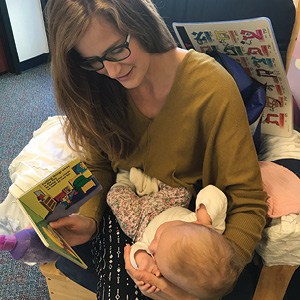
Alicia Pahl-Cornelius and Roma, born June 15, 2019.
Bond is exactly what Alicia Pahl-Cornelius did when she started listening to the CD of Jewish songs that came in her personally delivered Shalom Baby basket. Pahl-Cornelius says she loved her basket so much, she referred a friend who was days away from giving birth because she wanted her friend to have a special Shalom Baby experience of her own.
Shalom Baby is a complimentary care package filled with mom and baby gifts, and information on Jewish Tidewater that serves as an invitation for community engagement. The program is designed for first-time moms, those with multiple children, and birth and adoptive mothers. Delivery is scheduled three to six weeks after birth.
Shalom Baby is a partner program with Strelitz International Academy and PJ Library.
Register for a special delivery by contacting Carly Glikman, United Jewish Federation of Tidewater outreach manager, at 757-965-6127 or cglikman@ujft.org.
Congregation Beth Chaverim and Tidewater Chavurah held Joint High Holiday Services
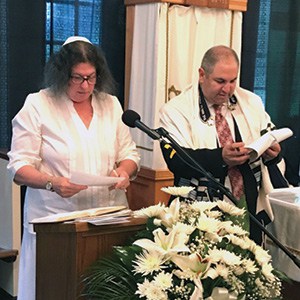 Wonderful, warm, and meaningful High Holiday services were held with Tidewater Chavurah and Congregation Beth Chaverim in the Parrish Hall at Old Donation Episcopal Church in Virginia Beach. Combing the best of both Reform congregations resulted in inspiring services to welcome 5780.
Wonderful, warm, and meaningful High Holiday services were held with Tidewater Chavurah and Congregation Beth Chaverim in the Parrish Hall at Old Donation Episcopal Church in Virginia Beach. Combing the best of both Reform congregations resulted in inspiring services to welcome 5780.
Holding the services together was a large commitment for both congregations and took place due to the efforts of the congregations’ presidents, Bill Feldman of Tidewater Chavurah and Chad Bornstein of Congregation Beth Chaverim, as well as many others. Rabbi Ellen Jaffe-Gill and Jim Hibberd, soloist and guitarist, and the joint choir planned and led the services. Many congregants and leaders sang, chanted, and “schlepped” the necessary items to transform a multipurpose room into a sacred worship space.
A pot luck luncheon organized by Tidewater Chavurah and with contributions of both congregations followed Rosh Hashanah services. At the conclusion of Yom Kippur, a Break-the-Fast prepared by Congregation Beth Chaverim, was an awesome conclusion to the “Days of Awe.”
Betsy Blank
Saluting Israel’s heroes: the Benson family
Glenn Benson of Bethesda, Maryland, grew up in an ardently Zionist home, the son of South African immigrants who cared deeply for Israel. In high school he attended Jewish day school, participated in a B’nai B’rith Youth Organization summer trip to Israel, visited close relatives who’d emigrated from South Africa to Israel, and, as an adult working as a mortgage lender, supported his local Jewish Federation.
About eight years ago, Benson, 39, discovered a new passion—an exciting, different way he could devote himself to helping Israel.
Benson was attending a charity golf event with Bobby Cohen of Potomac, Maryland. Cohen, today the National President of Friends of the Israel Defense Forces (FIDF), a not-for-profit started by Holocaust survivors in 1981 to provide educational, cultural, recreational, and social programs for the men and women of the IDF, mentioned that FIDF’s Mid-Atlantic Region was launching a new chapter in Washington D.C.
“Something just clicked for me. It connected right away,” Benson says.
For Benson, FIDF represented a way he could directly support the very people who were defending the Jewish homeland.
“This idea, that if you can help people who are fighting for Israel’s security and freedom—I viewed it as not just Israel’s freedom, but Jews’ freedom everywhere,” he says.
In fact, Benson felt so strongly that he began talking about FIDF with friends, and in 2017 they decided the best way to spread the word was by sharing the story of FIDF over latkes and vodka with their contemporaries.
The initial idea was not to just hold a one-off fundraiser, Benson adds, but to
generate “brand awareness” among perhaps 30 peers. He figured if he and his friends somehow gathered 100 others “it would be a big win.” Instead, some 200 attended, and afterward many told him they were so excited they thought he should seek contributions for FIDF.
Last year, Benson and his friends organized an event and attracted more than 30 families to join one of FIDF’s signature programs, the Adopt-a-Unit initiative, in which people directly support the humanitarian needs of the soldiers of a specific IDF brigade or battalion.
Those types of FIDF programs, which tie supporters to the men and women of the IDF, “make the connection extremely tangible,” Benson says.
For Benson’s father, Nathan, 66, of Virginia Beach, that’s also one of FIDF’s big differentiators. FIDF allows supporters to help the IDF’s men and women directly through educational programs like post-army IMPACT! Scholarships for combat veterans; Fallen and Wounded Programs such as STRIDES, which provides athletic prosthetics, and LEGACY for the widows, children, siblings, and other family members of fallen soldiers; and assistance for Lone Soldiers—those who join the IDF without having an immediate family in Israel.
“You can pick where you think you can have an impact, so FIDF’s different than a lot of other organizations,” Nathan Benson says. “It could be an IMPACT! student or it could be taking care of a Lone Soldier. FIDF is something through which you can have a direct impact and you can see the benefit.”
When FIDF decided to launch a Virginia Chapter as well, Nathan Benson did not hesitate to follow in his son’s footsteps. It was FIDF’s overall credo about the men and women of the IDF—“their job is to look after Israel. Our job is to look after them” —that deeply resonated with Nathan Benson.
“Without a strong IDF, Jews around the world won’t be as strong,” Nathan Benson says.
For both men, FIDF is inextricably linked to their Zionist ideals of supporting Israel, a link that connects and unites every Jew, and spans cultural, political, or religious lines.
“Israel ties us together. If there’s no Israel, what does that mean for Jews around the world?” Nathan Benson asks.
Benson is co-chair of the FIDF Next Group in Washington D.C.
Nathan Benson and his wife, Ilana, are chairing the Second Annual Virginia Gala that will take place on December 5, at the Hilton Norfolk, the Main. The gala begins at 5:30 pm with a VIP reception, followed by a dinner reception and cocktails at 6:15 pm. The funds raised at this event will go toward FIDF well-being and educational programs for IDF soldiers.
For more information or to support FIDF, visit https://www.fidf.org/events/second-annual-virginia-gala, or contact Alex Pomerantz, FIDF director of Virginia, at Alex.Pomerantz@fidf.org, 757-472-9054.
JFS welcomes three new board of directors
Jewish Family Service of Tidewater recently gained three new board members. Mazel Tov to the new directors and to JFS for adding these women to the board, as each brings different expertise.
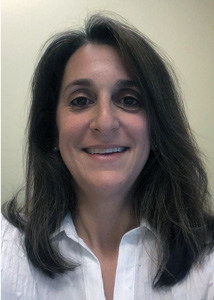
Rebecca Tall
Rebecca Tall
Fun fact—I have triplets (19-years-old, two boys and a girl). And, I lived in Japan.
Why?—I feel that JFS serves such an important purpose in our community and has helped so many people through all of its amazing programs. I feel that my time and energy can be put to good use on the JFS board. In addition, it closely aligns with my job at the Sentara Center for Healthcare Ethics and what we do there.
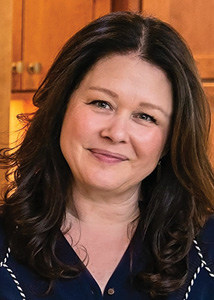
Jody Greason
Jody Greason
Fun fact—I recently completed a master’s program in clinical nutrition, and am beginning a second career as an integrative nutritionist. Also, I am an identical twin.
Why?—My why is simply I was asked. I accepted because I have always admired the work and mission of JFS, and have always wanted to help, but not really known how, in a meaningful way. Being Jewish, to me, is all about family, so this organization that helps families, as well as individuals without families, seemed like a natural fit.

Cantor Jennifer Rueben
Cantor Jennifer Rueben
Fun fact—I am the cantor at Ohef Sholom Temple.
I’m originally from Virginia and I am so happy to be back home, by way of Maine, Minnesota, Massachusetts, Florida, Israel, and New York.
I have a degree in opera and sang professionally for 10 years before becoming a cantor.
I am an extremely messy cook, but I love to do it.
Why?—I joined the JFS board because this organization embodies the “why” of Jewish practice and engagement. We study and we pray to teach us to welcome the stranger, to care for the needy, and to comfort the sick, which is what JFS is all about. I look forward to finding ways to strengthen the partnership between JFS and our area synagogues.
Your kid’s first bar/bat mitzvah invite: Everything you need to know
It happens around sixth grade—your child receives his or her first invitation to a bar or bat mitzvah.
It arrives in your email inbox or by regular mail, and you immediately think, “How is [insert child’s name here] old enough to be attending bar and bat mitzvahs?”
This thought is immediately followed by, “How am I old enough to have a kid old enough to attend bar and bat mitzvahs?”
Next comes the question, “What on earth should he/she wear?” And, finally, some version of, “Crap, how do I prepare him or her for this experience?”
Take a deep breath, grab a glass of…whatever (we don’t judge!) and settle in. We’ll get you through this. Here’s everything you need to know.
Before you go
Ask your child if he or she is friends with the child celebrating this milestone.
Your child does not have to attend every bar or bat mitzvah to which he or she is invited. Much like those birthday party invitations that “disappeared” before your child ever knew they existed, attendance is not required. But since your kid is no longer five, be sure he or she wants to attend this event. (Note: There is some nuance here. Every kid deserves to be supported by friends and classmates during this momentous milestone. However, you also don’t want to force your child to attend an event where he or she will be miserable.)
RSVP
For the love of God, RSVP. As soon as you can. The family needs a headcount for planning purposes. Don’t make them chase you down. I say this out of guilt from being on both sides—the person who has RSVP’d late and the host who’s had to chase down guests.
Put it on your family calendar. And notify the hosts if plans change.
We all double book and flake sometimes, and unfortunately timed stomach bugs happen. But it sucks when guests RSVP and don’t attend, and then…crickets. The people who did that at my son’s bar mitzvah are dead to me. Dead, I tell you.
The clothes
Depending on your kid, this may or may not be a struggle. If your kid loves dressing up in twirly dresses or likes to look dapper in a suit and tie, congratulations! My boys equated ties and belts with suffocation, torture and death, so, alas, our path was not an easy one.
While attire varies by synagogue and sometimes even by region, a good rule of thumb is to dress somewhat conservatively. For girls, this means a dress that is long enough not to shock your grandma and covers the shoulders. She doesn’t have to dress like a nun, but this isn’t the occasion to wear that backless bandage dress that she received as a hand-me-down. Sleeveless dresses and pants are acceptable in some synagogues, but I always find it better to err on the side of coverage on these occasions. Cardigans are always helpful here.
Clothing for boys generally means, at the very least, some sort of button-down shirt tucked into khakis or dress pants. Depending on your kid and the occasion you can add a tie, a blazer or even spring for a full-on suit. However, this does not need to bankrupt you! While jeans are a no-no, you can get perfectly respectable outfits at places like Target and Walmart—and this isn’t a bad idea since your kid is going to outgrow whatever you buy before you blink.
A word about shoes. Leave basketball sneakers and track shoes at home. Cute slip-on sneakers can be OK, especially if your child doesn’t have any other occasion to wear dress shoes. And make sure your kid can walk in the shoes. If I had a nickel for every girl I’ve seen tottering around in platforms, I would be able to buy myself a fancy, overpriced latte—or 10!
My final word of advice here: When in doubt, ask another parent. This is what group texts are made for.
How to behave in synagogue
If you’ve never been to synagogue, you may want to read up a bit, just so you are familiar enough to coach your child. In very broad strokes, here is what you need to know.
Arrive on time(ish)
Check the invitation for the time services begin. Depending on the branch of Judaism, you can add 30 to 45 minutes or so—services can be long and kids get squirmy, but you also don’t want to miss the parts led by the bar or bat mitzvah child.
Cover your head
Synagogue policies vary, but generally speaking, Jewish males cover their heads with kippahs and many women do as well. Most of the time, there will be special kippah provided by the hosts for the occasion—which is helpful if you don’t have one on hand, but you can also absolutely BYO. Explain to your child that wearing this is a sign of respect and that stuffing it in their pocket is the opposite of that. The same goes for playing frisbee with it (depending on the shape of the kippah, they can catch air quite nicely).
Devices
Regardless of the level of observance of the family, phones and other handheld devices don’t belong in a synagogue service. You may want to suggest that your child leave his or her device at home. If this is not an option, stress that it should not be used in the synagogue. At all, unless someone needs to dial 911 and your child is the only person on the premises with a phone—unlikely. There should be no texting, playing games, surfing the web, emailing, answering phone calls or taking pictures. Oh, and turn off the ringer—or maybe even the entire phone.
Be present
Synagogue services can drag on, even for the most devout and seasoned attendees. But your child is there to support his or her friend, and should, therefore, be present in the service. Bathroom breaks are acceptable, if kept to a minimum (like one), and you should return promptly. Any sort of en masse exodus is frowned upon—it is distracting and very noticeable.
Shhhh…
Everyone is guilty of talking in synagogue. Everyone. But when you have a pew full of kids, the whispers, comments, giggles and greetings can all add up to a cacophony. Explain to your child that talking should be kept to a minimum. Actually, tell them that there is no talking allowed. They’re going to talk anyway. But it is good to set expectations.
The Party
What to wear
Bar/bat mitzvah parties come in all shapes and sizes these days, from casual, kids-only parties at sports complexes to swanky cocktail-attire shindigs in nightclubs. The invitation will usually give you some sense of the expected attire. Shorts, a T-shirt and sneakers are fine for an event held at a Ninja gym or trampoline park. Otherwise, some dressing up is required. Attire for boys is similar to synagogue, and girls can wear something dressier and worry less about skin coverage.
Some pro tips
Most of the same rules from synagogue apply for the party. While phone usage is not strictly verboten, it isn’t cool to spend the entire party playing Minecraft. A few additional words of advice regarding parties: Make sure your kid has a snack first—sixth- and seventh-graders don’t always have the most mature palates and may balk at the more sophisticated fare. The last thing you need at the end of the evening is an overtired AND hungry kid. You should also not feel compelled to adhere to the pickup time suggested by the party hosts. If a party goes until 11 p.m. or midnight and you know that your kid will be a disaster the following morning, it is OK to pick up a bit early. You won’t be the only one. No matter how mean your kid says you are.
In case of emergency
One additional word to the wise, and I learned this lesson the hard way: Discuss what your child will do if he or she needs help during the party. Many times the adults present will not know all the children in attendance. My son fell and sprained his ankle at a bat mitzvah party, and he didn’t know any of the grownups there and therefore didn’t ask for help. He called us, but there was not much I could do initially because he was 45 minutes away. This is even more important if your child has a life-threatening food allergy or other medical condition.
And some general etiquette
Gifts
If your child is the only one attending, a modest gift is all that is required. Perhaps a bit more if the guest of honor is a very good friend. There is no need to go beyond your means. Practices surrounding gifts vary widely in different communities, so this is another excellent occasion to call upon your mom squad for advice.
Congratulating and thanking
These are both important. Instruct your child to congratulate the bar/bat mitzvah and tell him or her they did a great job. (You ALWAYS say they did a great job, whether they have the voice of an angel or are completely tone deaf!)
Before leaving, instruct your child to go up to the parents of the bar/bat mitzvah, wish them a mazel tov and say thank you. It is the menschy thing to do. Even if your son or daughter is painfully shy, thanking your hosts is always appropriate. It is also a good time to practice these interactions—you are supposed to be awkward at this age—better now than at your first company holiday party.
Attending bar or bat mitzvahs is often the first step in the whirlwind socializing that comes with adolescence. Before you blink there will be quinceaneras, Sweet Sixteens and requests for the car keys. Take lots of pictures, buckle in and enjoy the ride!
Jennifer Modlinger
This article originally appeared on Kveller.

